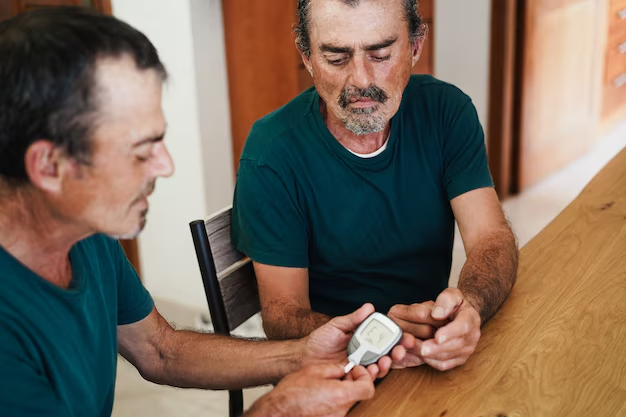Your Guide to Will Medicare Pay For Diabetic Supplies
What You Get:
Free Guide
Free, helpful information about Medicare FAQ and related Will Medicare Pay For Diabetic Supplies topics.
Helpful Information
Get clear and easy-to-understand details about Will Medicare Pay For Diabetic Supplies topics and resources.
Personalized Offers
Answer a few optional questions to receive offers or information related to Medicare FAQ. The survey is optional and not required to access your free guide.
Does Medicare Cover Diabetic Supplies? Here's What You Need to Know
Navigating healthcare expenses can be daunting, especially when managing diabetes. One crucial question that surfaces for many retirees and those on Medicare is: Does Medicare cover diabetic supplies? The short answer is yes, but understanding the scope and specifics can make a significant difference in managing your health effectively.
What Does Medicare Cover for Diabetic Supplies?
Medicare offers coverage for several essential diabetic supplies under Part B and sometimes Part D. Here’s a look at the essentials:
Medicare Part B
Medicare Part B (Medical Insurance) generally covers certain diabetic supplies, including:
- Blood sugar (glucose) test strips
- Blood sugar monitors
- Lancets and lancet devices
- Gluco-control solutions for calibrating monitors
- Insulin pumps and insulin used with the pumps (If medically necessary)
To qualify, these supplies must be prescribed by your doctor or healthcare provider.
Medicare Part D
Medicare Part D (Prescription Drug Plans) may cover:
- Insulin not used in an insulin pump
- Certain medical supplies used to inject insulin
Durable Medical Equipment (DME) Requirements
Note that for Medicare to cover these supplies, they must be obtained from a Medicare-enrolled DME supplier. Always verify the supplier’s eligibility to maintain coverage.
Tips for Maximizing Medicare Benefits
Enroll in a Medicare Advantage Plan: Some plans offer additional benefits, such as lower co-payments for diabetic testing supplies.
Consult Healthcare Providers Regularly: Ensure prescriptions align with Medicare’s coverage specifics to avoid unexpected costs.
Review Your Part D Plan Annually: Drug formularies change, and it’s crucial to ensure your plan covers the insulin and supplies you need.
Exploring Additional Financial Assistance Programs
Managing diabetes might require more than what Medicare covers. Here’s how you can explore additional support:
- Medicaid: If eligible, Medicaid might cover costs not covered by Medicare, including excess medical expenses.
- Discount Programs: Various pharmaceutical companies offer patient assistance programs that provide free or low-cost insulin.
- State Pharmaceutical Assistance Programs (SPAPs): Some states offer assistance to those on Medicare with limited income.
- Nonprofit and Community Programs: Organizations like the American Diabetes Association can offer resources and support for those in financial need.
While Medicare provides significant aid, exploring these options can bridge gaps in financial support, making diabetes management more manageable and cost-effective.
Bridging Gaps with Other Financial and Educational Resources
The intersection of healthcare and financial planning is crucial, especially for those living with chronic conditions like diabetes. Below are additional resources to help manage costs and enhance financial literacy:
Government Aid Programs: 🌟 SNAP, LIHEAP, and various local utility assistance programs can help manage overall living expenses, easing the financial burden.
Educational Grants and Scholarships: 🎓 For individuals returning to school or considering new career paths, educational grants can minimize costs and enable further learning opportunities.
Credit Card Solutions: 💳 Some cards offer introductory 0% APR on purchases or balance transfers, which can be a strategic way to manage healthcare-related expenses with minimal interest.
Being proactive with both healthcare and financial planning can pave the way for better management of not just diabetes, but overall life expenses, ensuring a balanced and less stressful life.
📌 Key Assistance Programs at a Glance:
- Medicaid: Additional coverage for low-income individuals.
- State Pharmaceutical Assistance Programs (SPAPs): State-specific aid for medication costs.
- Pharmaceutical Discount Programs: Direct from the manufacturer assistance.
- SNAP and LIHEAP: Federal programs to assist with groceries and utilities.
Whether you're exploring Medicare's coverage or the broader financial landscape, staying informed and proactive is the key to managing diabetes efficiently.
What You Get:
Free Medicare FAQ Guide
Free, helpful information about Will Medicare Pay For Diabetic Supplies and related resources.

Helpful Information
Get clear, easy-to-understand details about Will Medicare Pay For Diabetic Supplies topics.

Optional Personalized Offers
Answer a few optional questions to see offers or information related to Medicare FAQ. Participation is not required to get your free guide.


Discover More
- a Medical Provider That Accepts Medicare Assignment Must
- a Medical Provider That Accepts Medicare Assignment Must Quizlet
- a Medicare Patient Received Treatment That Isn't Covered By Medicare
- a Medicare Patient Receives Treatment That Isn't Covered By Medicare
- a Medicare Supplement Basic Benefit Is Quizlet
- a Medicare Supplement Companies
- a Medicare Supplement Policy Is Quizlet
- a Medicare Supplement Policy Must Not Contain Benefits Which
- a Patient Received Treatment In August Medicare
- Am I Eligible For Medicare
